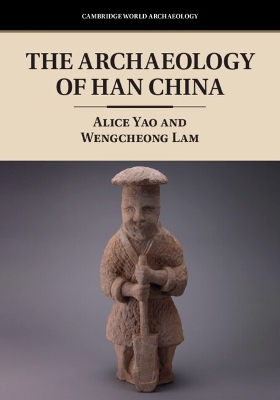
The Archaeology of Han China
Cambridge University Press (Verlag)
978-1-316-63643-5 (ISBN)
The Han Dynasty, which ruled from 202 BCE to 212 CE, is often taken as a reference point and model for Chinese identity and tradition. Covering a geographical expanse comparable to that of the People's Republic of China, it is foundational to understanding Chinese culture and politics, past and present. This volume offers an up-to-date overview of the archaeology of the Han Empire. Alice Yao and Wengcheong Lam study the period via an interdisciplinary approach that combines textual and archaeological evidence. Exploring the dynamics of empire building in East Asia, Yao and Lam draw on recent archaeological discoveries to recast Western Han imperialism as a series of contingent material projects, including the organization of spatial orders, foodways, and the expansion of communication and ritual activities. They also demonstrate how the archaeology of everyday life offers insights into the impact of social change, and how people negotiated their identities and cultural affiliations as individuals and imperial subordinates.
Alice Yao is Associate Professor of Anthropology at the University of Chicago. An anthropological archaeologist, she is the author of The Ancient Highlands of Southwest China (2016). Her decade-long collaborations with Chinese archaeologists have resulted in the uncovering of ruins of indigenous societies and Han administrative towns in Yunnan, which was recognized as one of the top ten archaeological discoveries in 2022. Wengcheong Lam is Associate Professor in the Department of Anthropology and the Department of History at the Chinese University in Hong Kong. An archaeometallurgist, he is the author of Connectivity, Imperialism, and the Han Iron Industry.
Introduction; Part I. Imperial Geography: 1. Imperial geography of the capital and core macro-regions; 2. Imperial geography and border formations in the Ordos and Lingnan regions; Part II. Food Production and Foodways: 3. Crop production in the Guanzhong Basin; 4. Crop production in the Yellow River valley and the New Territories; Part III. Crafts: 5. Craft production and consumption in the capital and Yellow River Macro-regions; 6. Craft production and consumption in the Hexi and Lingnan regions; Part IV. Death Ritual: 7. The (un)dead and the role of ritual in the crafting of sociopolitical networks; 8. Mourning practices and the cultivation of selves – views from the Hexi, Ordos, and Lingnan.
| Erscheint lt. Verlag | 12.12.2024 |
|---|---|
| Reihe/Serie | Cambridge World Archaeology |
| Zusatzinfo | Worked examples or Exercises |
| Verlagsort | Cambridge |
| Sprache | englisch |
| Themenwelt | Geisteswissenschaften ► Archäologie |
| Geisteswissenschaften ► Geschichte ► Regional- / Ländergeschichte | |
| ISBN-10 | 1-316-63643-7 / 1316636437 |
| ISBN-13 | 978-1-316-63643-5 / 9781316636435 |
| Zustand | Neuware |
| Informationen gemäß Produktsicherheitsverordnung (GPSR) | |
| Haben Sie eine Frage zum Produkt? |
aus dem Bereich


